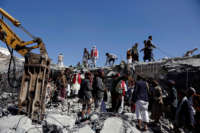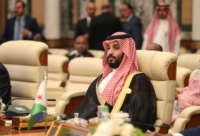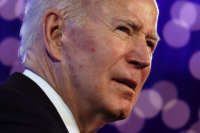
“The crown prince still wants to convince the world that he is saving his country,” wrote the Atlantic‘s Graeme Wood (3/3/22), “which is why he met twice in recent months with me and the editor in chief of this magazine.”
A glowing profile of Saudi crown prince Mohammed bin Salman in the Atlantic (3/3/22), promoting him as a reformer in the notoriously repressive kingdom, has raised questions about the magazine’s ethical integrity.
Technically the second in command after the 86-year-old king, bin Salman is widely recognized as the country’s most powerful figure. When a Saudi hit squad lured Washington Post columnist and Saudi critic Jamal Khashoggi to the country’s consulate in Istanbul to kill and dismember him (New York Times, 11/12/18), signs pointed to the murder being committed with the prince’s approval. Khashoggi was a vocal critic of the regime—specifically undermining the prince’s image as a modernizer, saying that he has “no interest in political reform” (NPR, 10/16/18)—and recordings of the grisly crime indicated the prince’s involvement (New York Times, 11/12/18).
A US intelligence report said that “bin Salman approved the operation to capture or kill the Saudi journalist” (CNN, 2/26/21). Committee to Protect Journalists senior Middle East and North Africa researcher Justin Shilad (2/26/21) said that the US and its allies should “sanction the crown prince” and his inner circle “to show the world that there are tangible consequences for assassinating journalists, no matter who you are.” No sanctions ever came.
‘Charming, warm, informal’
The murder, and the lack of accountability, have shocked press advocates. So imagine the horror journalists have had in response to a profile of bin Salman, written by Atlantic staff writer Graeme Wood, that makes a mockery of the entire matter. It quotes the prince saying that if he wanted to assassinate people, “Khashoggi would not even be among the top 1,000 people on the list.” Claiming to understand journalists’ anger at the murder, he insisted he was hurt by the affair as well: “We also have feelings here, pain here.”

Karen Attiah (Washington Post, 3/6/22): “Washington media has a long history of cooking up overbaked puff pieces on murderous autocrats—especially when those autocrats are key US allies.”
Karen Attiah at the Washington Post (3/6/22) noted the article’s “intellectual gymnastics” when Wood wrote that in his three years of visiting the kingdom, he’s been “trying to understand if the crown prince is a killer, a reformer, or both—and if both, whether he can be one without the other”: “Both,” he suggests, might be a balanced case of breaking some eggs to make an omelet. Most offensively, for Attiah, the piece went to great lengths to make the royal ruler relatable to the common American, pointing out that he eats breakfast with his kids. “The piece reinforces a superficial view of power,” Attiah wrote, “and treats the Saudi people as an afterthought.”
In Attiah’s view, bin Salman was allowed to “denigrate Jamal” when he asserted, “I never read a Khashoggi article in my life.” The idea that he had not kept tabs on such an influential critic—someone who served as editor of Al Watan, one of the country’s leading dailies, and was “fired from his role at the newspaper, not once but twice, both times for upsetting the regime and causing controversy” (Al Jazeera, 10/16/18)—would be laughable if the situation weren’t so tragic.
Yet this all worked on the Atlantic. The piece, written by Wood based on two meetings he and editor-in-chief Jeffrey Goldberg had with bin Salman, called him “charming, warm, informal and intelligent.” Saudi’s abysmal human rights record on things like torture and lack of free speech were mentioned only briefly, and gestures like women being allowed to sit with men in restaurants were painted as genuine and progressive reforms.
Saudi Arabia scores a 7 out of 100 on the political rights and civil liberties index of Freedom House, a conservative democracy watchdog funded by the US government. It is ranked 170 on Reporters Without Borders’ list of 180 countries in terms of press freedom. “Virtually all known Saudi Arabian human rights defenders inside the country were detained or imprisoned at the end of the year,” Amnesty International noted in its most recent report on the country.
Saudi Arabia’s involvement in the war in Yemen—which has directly and indirectly killed a quarter of a million people according to one United Nations estimate (UN News, 12/1/20), including 85,000 child deaths due to starvation (AP, 11/21/18)—is mentioned twice. First, the Atlantic reported that the White House has called for “accountability” for the “humanitarian disaster in Yemen, due to war between Saudi Arabia and Iranian-backed Houthi rebels.” But later it said that bin Salman “is correct when he suggests that the Biden administration’s posture toward him” on Yemen and other human rights issues “is basically recriminatory,” noting that the US should say the Saudi leader will be “rewarded for his good behavior” and that “no persuasion will be possible at all without acknowledging that the game of thrones has concluded and he has won.”
From interview to PR

Photo by Lynsey Addario of Arabian women attending a concert (Atlantic, 3/3/22).
Interviews with repressive leaders are fair game in journalism, but when they cross over into outright publicity it tends to be an embarrassment. For example, Vogue has been so ashamed of its positive cover story (3/11) on the wife of Syrian President Bashar al-Assad that it has gone to great lengths to scrub it from history (Washington Post, 4/25/12). But the Atlantic invested heavily in this piece; it’s not a fluke that got past the editors. The reporting involved several trips to Saudi Arabia by Wood, accompanied by Goldberg, the magazine’s editor—an unusual move, but one that showed that this story was of paramount importance. Images were supplied by the celebrated war photographer Lynsey Addario.
It’s hard to envision a similar treatment of someplace like, say, China. Imagine a top writer, photographer and the magazine’s editor making multiple trips to Beijing, conducting friendly interviews with President Xi Jinping that scarcely mention human rights concerns or the lack of a free press, dismissing concerns about political freedom with allusions to how many Western celebrities come to visit, all with photos that make the place look hip.
By contrast, late last year, the Atlantic (11/15/21) ran a lengthy piece about the rise of autocracy around the world, with a heavy emphasis on China and Venezuela. Saudi Arabia appears three times: first as a potential financier of pariah states, then for its complicity with China in targeting Uyghurs, and finally highlighting the Saudi royal family when it said that former President Donald Trump “cozied up to autocrats.” But the rest of the article focused its details on regimes less friendly with the United States.
Inside vs. outside game

PRWeek (10/15/19): “Saudi Arabia is turning to influencers to shed a positive light on the kingdom.”
Saudi Arabia’s closeness to the United States—as a sort of counter-balance of power in the Middle East to Iran—is often a point of confusion. How could an Islamic theocracy substantially linked to the 9/11 attacks (NBC, 9/12/21) also be a major recipient of US military weaponry (Reuters, 11/4/21)? Part of it is petropolitics. Part of it is realpolitik. And part of it is Saudi Arabia’s intense public relations strategy.
PRWeek (10/15/19) reported on the regime’s public relations blitz to push both the country’s modernization and tourist offerings: “Several PR firms are leading these efforts, including Influencer…and Consulum.” The trade outlet added that “influencers are being taken on all-expenses-paid trips to explore Saudi Arabia’s tourism hot spots,” including “the Red Sea—a famous diving spot—and the Al Ula desert.”
The country has paid millions of dollars for good publicity in Britain (Guardian, 10/19/18). CNBC (1/7/22) reported that it hired Nicolla Hewitt, “who was once a producer for news anchor Katie Couric,” as a consultant, “joining the ranks of American influencers who work for the kingdom.” In 2018, CNBC (10/12/18) said that “records show the country has spent more than $23 million on its DC lobbying efforts since last year”; it paid “$100 million to consultants and public relations firms in the decade after the September 11, 2001, terrorist attacks in order to bolster its public reputation.”
Josh Stewart of the Sunlight Foundation told the Washington Post (4/20/16):
Saudi Arabia is consistently one of the bigger players when it comes to foreign influence in Washington…. That spans both what you’d call the inside game, which is lobbying and government relations, and the outside game, which is PR and other things that tend to reach a broader audience than just lobbying.
Willful participant

Jeffrey Goldberg, quoted by JTA (8/2/16): “I like a lot of the people at Haaretz, and many of its positions, but the cartoonish anti-Israelism and antisemitism can be grating.”
But good PR can only go so far. There needs to be a willful participant in the journalistic class to receive the PR and run with it.
Goldberg’s investment in the piece is telling. Goldberg, who once served as an Israeli prison guard, is fiercely pro-Israel (Jewish Currents, 8/2/18). He even attacked the Israeli newspaper Haaretz for apparent disloyalty to Zionism (Jewish Telegraphic Agency, 8/2/16). Not only is Saudi Arabia part of the US realm in the Middle East, bin Salman has said that there is a potential for an alliance between Saudi Arabia and Israel (Jerusalem Post, 3/3/22), continuing the latter country’s success in forging ties to Western-friendly Arab countries like Bahrain and the United Arab Emirates (BBC, 9/15/20). Goldberg (Atlantic, 9/16/20) praised these deals not only as a progress for Israel, but as a growing bulwark against the Palestinians and Iranian power .
The crown prince has been buttering up Goldberg with Israel-friendly talk for a while. After meeting with the crown prince in 2018, Goldberg told conservative talk show host Hugh Hewitt (4/3/18) that the relationship between Israel and Saudi Arabia was “evolving” because they “have a common enemy—Iran,” adding that “Saudi Arabia understands that Israel does not want to harm Saudi Arabia.” The prince told Goldberg that Israel had a “right” to a homeland (Middle East Eye, 4/5/18).
At present, reports swirl (Middle East Monitor, 3/8/22) that Saudi Arabia has a chance to strengthen its link to the US, as the Biden administration has reportedly looked to the nation as an oil supplier in order to isolate Russia. Rep. Ilhan Omar (D.-Minn.) said in response that any attempt to “strengthen our relationship with the Saudis” would be a “wildly immoral act.”
Saudi Arabia couldn’t have asked for a better advertisement at a better time. That such a thing would appear in a storied and established magazine like the Atlantic is an insult to its readership.
You can send messages to the Atlantic here (or via Twitter: @TheAtlantic). Please remember that respectful communication is the most effective. Feel free to leave a copy of your message in the comments thread of this post.
The post Saudi PR Pays Off at the Atlantic appeared first on FAIR.
This post was originally published on FAIR.











